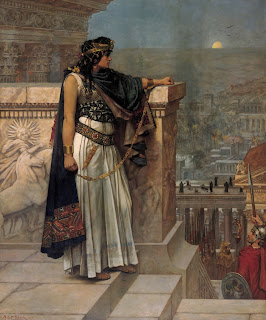Women as Warriors: Zenobia (Part 1)
Queen Zenobia's Last Look Upon Palmyra,
by Herbert Gustave Schmalz (1856 - 1935)
by Herbert Gustave Schmalz (1856 - 1935)
856-1935)
History is a wash cycle, more so humanities forever fight with it's superstitious bondage (religion) that is completely self imposed, namely to try and override it's fears of life and death. Camille Paglia's misplaced (and bizarre) ramble in Sexual Personae, which, she writes from a cultural perspective - attempts to justify the catharsis of civilization (through antiquities, religion and art) by differentiating a war between the sexes (in her view), between the 'dark nature' of the feminine and the controlling mania of the masculine. It is an awful simplistic take, that in it's self, is a vain attachment to the most laughable of 'pop culture' sciences: evolution psychology, which thankfully has been subjugated to the back of the class (by the pupils) as an amusing attempt at finding answers from the realms of chaos. Which is us. The point is, we are doomed to repeat history if we cannot learn specifically from it and culturally adapt to the unprecedented changes in our environment and nuclear war is the ultimate self induced suicide bombing - if we reach that crescendo of obliteration from our own hands. But war is our positioning for power, the illusions of stability is man's arrogance and weakness, in the sense his ability to be conned by crony capitalist systems, which is our current predicament through and through. Armed conflict is the ultimate distraction, to find an enemy that is not ourselves. War and conflict is an inevitability, which is obvious throughout history. Art depicts conflict, dissent, it is the beauty, ugliness in all our contradictions - not specified to the sexes.
Strategy is universal, there is Sun Zhu's 'Art of War', which is a magnificent example of early China's feudalistic excellence (replaced by communist/crony capitalism - which is turning out to be the ultimate disaster for the world). The West, has Baltasar Gracian (early 1600s) more specifically his Machiavellian inspired maxim of strategy and conflict, written via the 'Art of Worldly Wisdom', making the argument of waging a clean war:
"The wise person can be driven to war, but not a dishonorable one. Act like the person you are, not the way they make you act… To conquer without nobility is not victory but surrender."
As mentioned war, more so strategy is solely humanistic, non defined to either of the sexes, certainly not Paglia's absurd assertion (in her opinion) of the eternal conflict between man and woman.
Men have made some of the most appalling strategic blunders you could ever wish for, the blunt force idealism of conflict can never be held up as a showpiece of male ingenuity or design, it is, if anything a failed masochist view of self annihilation.
So, thus continues the ongoing saga of Women as Warriors:
Queen Zenobia.
A player beyond players, pure strategic and self preservation and legacy building from this warrior Queen. Essentially the main components of maintaining superiority against an enemy. Apparently even in defeat, she still came out smiling:
"In 269-270, Zenobia and her general, Zabdeas, conquered Egypt, ruled by the Romans. Roman forces were away fighting the Goths and other enemies to the north, Claudius II had just died and many of the Roman provinces were weakened by a smallpox plague, so the resistance was not great. When the Roman prefect of Egypt objected to Zenobia's takeover, Zenobia had him beheaded. Zenobia sent a declaration to the citizens of Alexandria, calling it "my ancestral city," emphasizing her Egyptian heritage.
After this success, Zenobia personally led her army as a "warrior queen." She conquered more territory, including Syria, Lebanon and Palestine, creating an empire independent of Rome. This area of Asia Minor represented valuable trade route territory for the Romans, and the Romans seem to have accepted her control over these routes for a few years. As ruler of Palmyra and a large territory, Zenobia had coins issued with her likeness and others with her son's; this may have been taken as a provocation to the Romans though the coins acknowledged Rome's sovereignty. More urgent: Zenobia cut off grain supplies to the empire, which caused a bread shortage in Rome.
The Roman Emperor Aurelian finally turned his attention from Gaul to Zenobia's new-won territory, seeking to solidify the empire. The two armies met near Antioch (Syria), and Aurelian's forces defeated Zenobia's. Zenobia and her son fled to Emesa, for a final fight. Zenobia retreated to Palmyra, and Aurelius took that city. Zenobia escaped on a camel, sought protection of the Persians, but was captured by Aurelius' forces at the Euphrates. Palmyrans who did not surrender to Aurelius were ordered executed.
A letter from Aurelius includes this reference to Zenobia: "Those who speak with contempt of the war I am waging against a woman, are ignorant both of the character and power of Zenobia. It is impossible to enumerate her warlike preparations of stones, of arrows, and of every species of missile weapons and military engines."
From: http://www. womenshistory.about.com/od/ancientqueens/a/Zenobia.htm
In defeat:
"Aurelian later returned yet again to Palmyra, putting down another rebellion; eventually, repeated plundering and a shift in the trade routes put an end to Palmyrene civilization. How long Vaballath survived after his mother's capture will never be known. It is popularly believed that Zenobia's life was spared by her adversary, and that, adapting remarkably well to her new circumstances, she married a Roman senator, living in the manner of a Roman matron on a Tibur estate presented to her by the very Empire against which she'd so daringly risen."
Also a fantastic pod-cast from howstuffworks re: Zenobia: http://blogs.howstuffworks.com/transcript/zenobia-warrior-queen/



Comments
Post a Comment